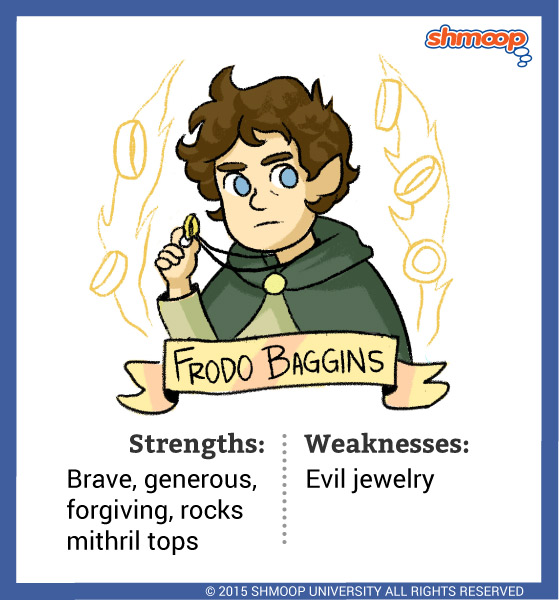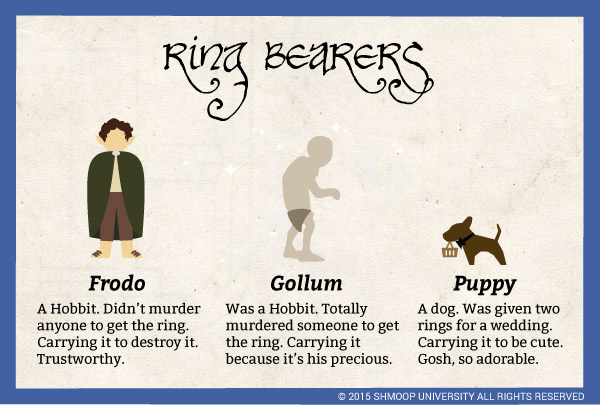Character Analysis

(Click the character infographic to download.)
Not to get too grim or anything, but The Return of the King is mainly about confronting different kinds of evil: the evil of emotional abuse (Denethor), the evil of bitterness and disappointment (Saruman), and the evil of greed (gosh, there are a lot of thieving orcs in this novel). But the worst thing about Frodo's own particular battle against evil is that it is also a struggle against himself. Everywhere he goes, no matter what he does, he can't hide from the evil of the Ring. It's really the worst kind of torture we can imagine, so we'll just let Frodo describe it for himself:
No taste of food, no feel of water, no sound of wind, no memory of tree or grass or flower, no image of moon or star are left to me. I am naked in the dark, Sam, and there is no veil between me and the wheel of fire. I begin to see it even with my waking eyes, and all else fades. (6.3.30)
To summarize this passage: Frodo in Book Three? Not in a good place. Because the Ring is slowly starting to take control of Frodo's soul, he can never escape it. It's always with him, even when he closes his eyes. The pressure never stops; in fact, it keeps getting worse and worse. And the thing is, Frodo is only human—or rather, only hobbit. He isn't built for a 24/7 struggle against the worst kind of evil. It's not in the nature of Frodo—or any ordinary mortal—to fight all the time without stopping.

(Click the infographic to download.)
So, to make a long story short, eventually, even Frodo fails. He fights the good fight for longer than any of the other characters could have managed (we're looking at you, Boromir). But by the end of his quest in Mordor, he is just too exhausted to keep fighting. And he finally takes the One Ring for himself.
But then, if Frodo does take the One Ring, if in the end he does try to steal Sauron's power, why is he still the hero of The Lord of the Rings? Let's think about the reasons:
Reason #1: Humbleness
So, we've already said that Frodo's quest is basically impossible. We mentioned that way back in our "Character Analysis" of Frodo in the The Fellowship of the Ring learning guide. By Fellowship Book One, Chapter Two, Frodo is already freaking out when Gandalf throws the Ring into his fireplace. How is Frodo going to manage a year from that moment, when he has to throw the Ring into a volcano that will destroy it? So Frodo has a snowflake's chance in Orodruin of actually getting the job done on his own once he reaches the end of this long, miserable Ring-quest.
And you know what the most amazing part of this whole thing is? Frodo knows that he's not going to succeed. But Frodo is so set on doing his duty, even when he is at the end of his strength, that he literally crawls on his hands and knees up the side of Mount Doom to at least try. Frodo never stops moving forward, even when the ending of his quest is definitely in doubt.
It's the Journey, Not the Destination
Could his humbleness and perseverance mean that Frodo is giving us some moral lessons? You betcha. First, it's better to focus on the quest than on the outcome. If you're only thinking about how great things will be once you have done something, you get into Boromir and Denethor territory: wanting the glory that comes with success without worrying too much about how you're going to achieve your goals.
Frodo never really seems to think about what he will do once he destroys the Ring. He only knows that he has to keep on going, which is what makes Frodo different from all the other characters. Frodo never makes the mistake of assuming that he will succeed, since that would mean that he feels too much pride and arrogance in his own abilities.
Responsibility
This leads us to Frodo's second moral lesson: do your duty. Later on in their adventure to Mordor, when Frodo is barely able to walk from the pain and pressure of the Ring, Sam asks him if he can keep going. And Frodo says something that we think really illustrates his character: "'I can manage it,' said Frodo. 'I must.'" (6.3.9)
In other words, the only thing that gets Frodo moving on this long and miserable road is the knowledge that he has to. He knows that he can keep going because he must. Frodo has the most amazing sense of responsibility we have ever seen: we would probably have given up the whole Ring Quest somewhere around the Dead Marshes and gone home for hot chocolate.
Frodo's humbleness—his sense that he is too ordinary and average to complete his quest successfully, but he has to try as hard as he can anyway—makes him a highly unusual hero. But his humility also makes him perfect for this particular quest. Frodo is the only one who can carry the Ring because he truly doesn't want to; he just accepts that he has to. For Frodo, carrying the Ring is a sacrifice rather than a cause for pride or honor. So the Ring has less to work with as it tries to corrupt him.
(Sidebar: if you start noticing that our analysis of Frodo gets more and more religious-sounding, it's not just you. Tolkien is pretty straightforward about the fact that Middle-earth is not supposed to be a Christian land, but that he still wrote The Lord of the Rings with specifically Christian ideas of self-sacrifice and forgiveness in mind. There are more than a few Biblical echoes in the series, especially in The Return of the King. For more on Tolkien and Christianity in general, check out our section on the subject in "Symbols, Imagery, Allegory.")
Reason #2: Forgiveness
But then, if Frodo knows that he's going to fail (as, in fact, he does), how does the Ring Quest get done anyway? We know that Gollum, maddened by the Ring, bites Frodo's finger off (ugh) and then falls into the Cracks of Doom with the Ring in his hand (oops). That's the straightforward explanation: Gollum gnaws the One Ring off of Frodo's finger, and then falls into the Cracks of Doom, and bam! Total destruction of Sauron's power over Middle-earth forever and ever. Simple right? Okay, maybe not so simple.
First of all, why is Gollum still around to save the day (unintentionally) in the first place? Because all the way back in The Two Towers, Frodo stopped Sam from killing Gollum. Honestly, from the point of view of a soldier in wartime, killing Gollum might have seemed like the smart thing to do. Gollum is obviously not to be trusted: he is a murderer; he would do anything to get the Ring back from Frodo; and besides, he already blabbed everything he knew about the Ring to Sauron once, leading the Ringwraiths to the Shire in the first place. It would make good strategic sense to get rid of the guy.
But Frodo keeps stepping in to save Gollum over and over again, first from Sam, then from Faramir, and so on. Even though Gollum has hurt Frodo in a lot of ways, Frodo is a big enough hobbit to let Gollum go. He pities Gollum's pathetic state, and he shows Gollum mercy instead of seeking revenge when Gollum is in his power. It may not be a good strategic decision, but it's a great moral one.
And because Frodo does not take Gollum's death into his own hands, Gollum is still around to jump in at the end and keep Frodo from making the biggest mistake of his life. Frodo leaves everything to fate, and it works out for him. He builds up good karma being decent to Gollum, and that karma comes back to help Frodo when he needs it most (again, even if Gollum doesn't mean to do anything so positive).
Tolkien compares Frodo's mercy to the Christian Lord's Prayer:
Lead us not into temptation, but deliver us from evil […] There exists the possibility of being placed in positions beyond one's power. In which case (as I believe) salvation from ruin will depend on something apparently unconnected: the general sanctity (and humility and mercy) of the sacrificial person). (Source, pg. 252)
Frodo is definitely in a "position beyond [his] own power." He cannot succeed in destroying the Ring. But "salvation from ruin" comes from Frodo's own "humility and mercy." Because Frodo is humble, and because he forgives Gollum, Frodo in turn gets saved from doing something truly stupid at the Cracks of Doom.
Frodo the Sacrificial Lamb
And that's why Frodo gets to be the "sacrificial person," in Tolkien's words: he's the only choice for the Ring Quest because he has these two rare qualities of humbleness and forgiveness. But he also eventually has to leave Middle-earth because he, himself, is the sacrifice to keep Sam and the rest comfortable and happy.
The price Frodo pays for saving the world is that he no longer gets to be a part of it. He has faced evil too directly to just ignore it and go back to the daily grind of regular life. Check out this passage, when Frodo, Merry, Sam, and Pippin return to the Shire. Merry comments:
"Well here we are, just the four of us that started out together […] We have left all the rest behind, one after another. It seems almost like a dream that has slowly faded."
"Not to me," said Frodo. "To me it feels more like falling asleep again." (6.7.75-6)
To Merry, real life is where he was born and raised: the Shire. He may have been changed by the War of the Rings, but he can still start up his old existence again. For Frodo, real life is what he discovered as he carried the Ring. He no longer belongs in the Shire.
So now that he has saved the entire world, Frodo discovers that he can no longer live in it anymore. That's why Frodo has to leave. He carries the memories of the War of the Ring that everyone else can more or less put behind them.
It feels unfair to us that Frodo has to sacrifice himself so that everyone else can move from the War of the Ring, but Frodo is a better person than we are. He is the one who reassures Sam, "It must often be so, Sam, when things are in danger: someone has to give them up, lose them, so that others may keep them" (6.9.76). Sniff. Excuse us while we run off and cry now.
Timeline